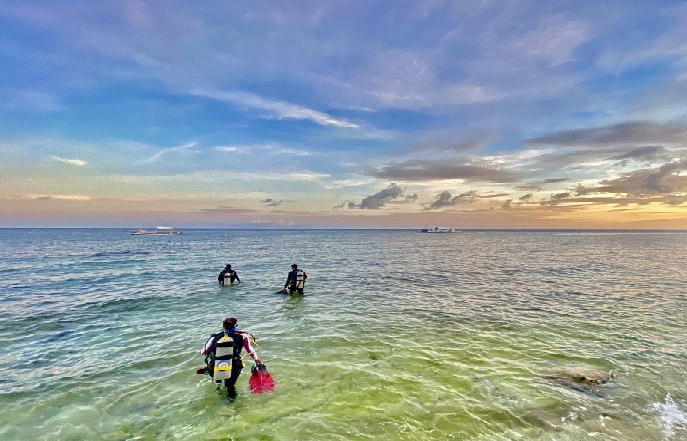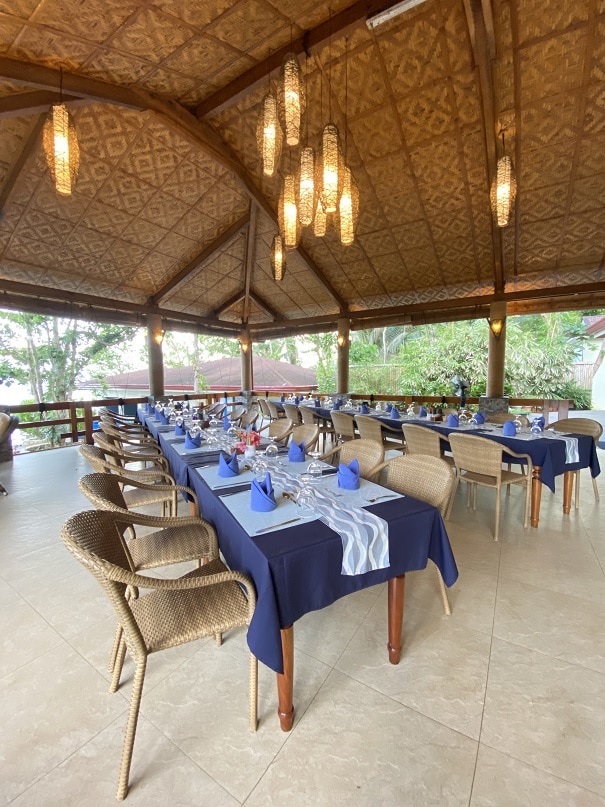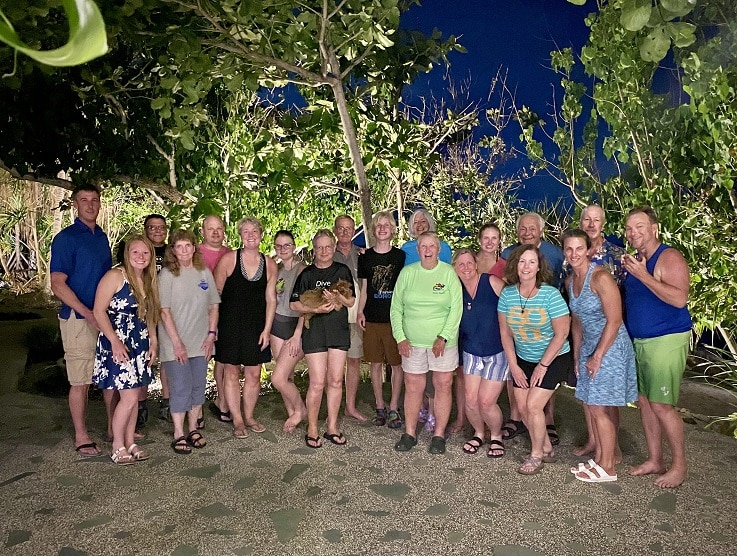News
Magic Resorts: ready to welcome you back to the Philippines

Magic Resorts are finally able to welcome you back to their two renowned dive resorts in the Visayas (Central Philippines), after the Philippines reopened its borders last February after 2 years of pandemic.
Both resorts, Magic Island Dive Resort in Moalboal, Cebu and Magic Oceans Dive Resort in Anda, Bohol, are fully operational and were able to survive the lockdown that lasted for 2 years in the Philippines. When the reopening of the Philippines was announced, both resorts underwent a big renovation and restoration to be able to offer the same quality of service as guests could previously expect.

With the same staff members still in their positions, offering the world-famous Filipino hospitality with their welcoming smiles, Magic Island and Magic Oceans are ready again to offer an unforgettable diving holiday. Dive master Manuel (also known as Mani) and Jason, didn’t lose their eye for detail and can still find the smallest critters around Moalboal and the notorious mating Mandarin Fish on Magic Island’s house reef. Of course, the tasty mocktails after your dives in Magic Oceans will be served by the lovely bar lady Esther, whilst the popular singing chef, is preparing the most delicious food to finish off a perfect holiday. Great diving, great service – that’s the ultimate Magic experience!
Magical diving
All the dive enthusiasts from America and Europe who already took advantage of the reopening of the Philippines and spent their diving holiday at one of the Magic Resorts, have been warmly welcomed, not only by the staff, but also by the marine life around Moalboal and Anda. The first passing Whale Sharks, jumping Thresher Sharks, mating Mandarin Fish and even mating Flamboyant Cuttlefish have been spotted! Everybody is excited to see happy divers again after such a long time.

Entering the Philippines
On February 11, the first day of the reopening, the first hundreds of foreign tourists entered the Philippines. Since then, 100,000 tourists have entered the country to enjoy a tropical holiday, for most of them a long-awaited trip. If you bring your valid passport, return ticket, proof of covid-vaccination, a negative test (PCR/antigen) and an insurance coverage for costs for covid-treatment, you may enter the country. A continuous smooth course of the tourist flow may lead to the lifting of some of the requirements really soon!
Get ready for your unforgettable diving holiday at Magic Resorts and book your holiday with some great opening discounts: email reservations@magicresorts.online for details!
News
Book Review: Fire on Monroe Bravo by Fred Lockwood

Fire on Monroe Bravo is the latest book in the Jack Collier series by Fred Lockwood. Our story begins with our lead characters, Jack and Sandro, owners of Marine Salvage & Investigation Company, arriving on the Monroe Bravo Oil & Gas Platform in the North Sea. Having secured a contract for their vessel the MV Stavanger to act as support ship to the platform for TransGlobal Oil, our protagonists are on a celebratory visit.
However almost as soon as they arrive a series of explosions rock the platform, causing huge damage, loss of life and the very real danger of a massive human, ecological and financial disaster.

As the danger mounts for both our heroes and the surviving workers, Jack and Sandro will have to escape the inferno, all while trying to save the platform and the men still trapped unable to help themselves.
The disaster sets the scene for the unfolding story lines following the fate of the platform and our main characters, the police investigation into a suspected terrorist act and the actions of TransGlobal Oil as they attempt to navigate the pubic outcry and financial repercussions.
In his eighth book, Fire on Monroe Bravo, Fred Lockwood delivers an explosive thriller, with plenty of above and in-water drama, and our heroes fighting for survival, what more can you ask for?
We thoroughly recommend this read and look forward to the next in the series. For more information about his book series, you can check out the reviews of his previous books here on Scubaverse.
- Title: Fire On Monroe Bravo
- Author: Fred Lockwood
- ISBN: 979-8325324536
Available in a paperback version and for Kindle from Amazon and book stores.
Blogs
Alonissos: The complete diving destination (Part 1)

In June we were incredibly fortunate to be invited to dive in Alonissos, a small Greek Island in the Sporades island chain located in the North Aegean Sea. While I have long been a big fan of the Greek Islands as a great holiday destination, I had not had the opportunity to do any diving on previous visits and Mike and I were extremely excited to see what Alonissos had to offer both above and below the surface!

The Sporades are easily accessible via the airport in Skiathos (the first island in the chain), which is served by Jet2 flights from all major UK airports from May through October. Numerous ferries and charter boats make island hopping from Skiathos Town a breeze. After an hour boat ride, the picturesque port of Patitiri was a wonderful introduction to Alonissos, where we were met by our gracious hosts Kostas of Albedo Travel and Dias of Alonissos Triton Dive Center. Mike and I were delighted to be staying at the Paradise Hotel, aptly named for its stunning views over the sea and great location for walking to the waterfront.

Alonissos is beautifully situated in the National Marine Park of Alonissos and the Northern Sporades, the largest marine protected area in Europe. The surrounding seas offer fabulous marine life, including incredibly rare species such as the Mediterranean monk seal. They boast deep walls covered in gorgonians and sponges, stunning topography with caverns, swimthroughs and pinnacles, and the first accessible ancient shipwreck from 500BC!

In locations where historical sites have been reported, the waters are largely restricted, but with collaboration between government, underwater archeologists and dive centres, incredible underwater museums are being created for a truly unique diving experience. Alonissos is home to the first of these, the Ancient Shipwreck of Peristera Accessible Underwater Archeological Site. The chance to dive into history (along with reports of healthy reef life and amazing underwater topography) meant Mike and I were keen to get in the water.

Our introduction to the diving around Alonissos was at the Agios Georgios Pinnacles, in the channel between Alonissos and Skopelos. This fantastic site was named “The Chimney,’ and proved to have a huge amount to see. We got to a decent depth here (over 25m), and marvelled at a colourful reef wall with a wonderful swim through whose rocky walls were absolutely covered with life. As well as brilliant topography there was no shortage of macro life here. We saw numerous nudibranchs, five different species in total. The second dive at Mourtias reef nearby was a shallower dive along a nice wall with lots of crevices. Several moray eels and grouper called this site home. We enjoyed looking in the crevices for lobster and smaller benthic life, such as cup corals and tunicates.

Our itinerary allowed us two dives a day with afternoons left to explore the island with our hire car and evenings to enjoy the famous Greek hospitality. This proved to be a lovely mix of in-water and land based diversions.

The next days diving to the Gorgonian Gardens and Triton’s Cave was to be even better! These two stunning sites are nothing short of fabulous. The Gorgonian Gardens was a deep wall near to the Agios Georgios islands. The ever-present currents in this deep channel meant that the sea life was amazing … the namesake Gorgonian sea fans dotted the wall at a depth of 30 to 50 meters, getting ever larger the deeper we went. Above 30m was by no means less beautiful, with sponges, corals, scorpionfish, moray eels and some rare and colourful nudibranchs.

The second shallower dive of the day was to Triton’s Cave or the Cavern of Skopelos, on the east side of that island. The spectacular rock formations had wild striations both above and below the water making a truly epic topography. The cavern entrance was at 14m, and big enough for a buddy pair, winding up to 6m and passing two beautiful windows out into the blue. Emerging from the cavern, the light at the shallower depths and the incredible rock formations made for a fantastic gentle swimming safety stop and we all surfaced by the boat with massive grins.

Check out our next blog :Alonissos: The complete diving destination (Part 2)” to hear about our amazing dive on the 2500 year old Peristera Wreck!
Thanks to:
Alonissos Triton Dive Center https://bestdivingingreece.com/
Albedo Travel https://alonissosholidays.com/activities/
Paradise Hotel https://paradise-hotel.gr/
Alonissos Municipality https://alonissos.gr/en/
-

 Blogs2 months ago
Blogs2 months agoDiving With… Nico, Ocean Earth Travels, Indonesia
-

 News1 month ago
News1 month agoMurex Bangka Announce New Oceanfront Cottages & Beachfront Dining
-

 Blogs2 months ago
Blogs2 months agoA new idea in freediving from RAID
-

 Marine Life & Conservation1 month ago
Marine Life & Conservation1 month agoIceland issue millionaire whale hunter a licence to murder 128 vulnerable fin whales
-

 Marine Life & Conservation2 months ago
Marine Life & Conservation2 months agoThe Shark Trust Great Shark Snapshot is back
-

 News3 months ago
News3 months agoCharting New Waters; NovoScuba Goes Global with the Launch of their Revolutionary Dive Training Agency!
-

 Gear News1 month ago
Gear News1 month agoNew Suunto Ocean – a dive computer and GPS sports watch in one for adventures below and above the surface
-

 Marine Life & Conservation Blogs2 months ago
Marine Life & Conservation Blogs2 months agoBook Review: Plankton















